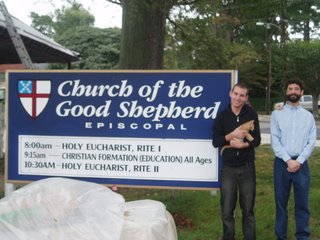Is There a Jewish Connection to Celtic Punk/Rock?
There’s nothing unique about this fusion, either in my life or at large. Several years ago, when I went to an Irish festival for the first time, I enjoyed the experience with what I called a “carload of Jews.” When I went to Ireland last year, I searched far and wide for a “shamrock dreydl.” The story of Irish Jewry was captured in the 2003 documentary Shalom Ireland; the film's soundtrack was recorded by a Celtic-klezmer hybrid band named Ceilzemer, which consisted of members of the Freilachmaker Klezmer String Band (which itself cites a Celtic influence) and the Irish band Driving With Fergus.
I’m a Jew in love with Celtic rock/punk, both because it’s fun punk rock diffused with a nice variety of melodious sounds and because it’s a compelling, proud cultural expression. Perhaps I’m overanalyzing all this and it’s silly to try to find a Jewish connection to another culture. On the other hand, I’ve wondered for the past few weeks whether there is some kind of connection that I’m tapping into.
I thought back to an enlightening blog post by Alicia Jo Rabins, the fiddle player for New York-based klezmer-punk band Golem. In the post, she cited her appreciation for the pioneering Celtic rock of the Pogues and Shane MacGowan & The Popes and talked about the similarities in punking up and rocking out to different varieties of traditional ethnic music. I e-mailed Alicia to ask for her two cents, and we seem to be on the same page:
I'm definitely inspired by all sorts of musicians who take traditional music and then update it or merge it with contemporary influences …. Irish music (via the Pogues) was the first folk tradition I really heard. Plus, I could totally get into their take on it, because they obviously had this attitude of "respect tradition/fuck convention" which is pretty much my philosophy. So I can't speak for the rest of Jews, but I know that hearing the Pogues … definitely inspired me to deal with my own tradition the same way, both musically and in my life.I tried getting in touch with New England Celtic punks the Pubcrawlers, whose accordion and tin-whistle player goes by the name “The Rabbi,” but I never heard back and I don’t know if this fellow is actually Jewish. I also sought out various folk-punk bands that combine Jewish and Celtic styles. Massachusetts-based Josh Lederman y Los Diablos, the self-professed kings of “Irish-Jewish folk-punk,” did not respond to my requests for comment. New Orleans’ Zydepunks, which also incorporate zydeco and other folk stylings, noted that while they love klezmer music, none of their band members is Jewish.
And then there's Menashe Yaakov, guitarist/vocalist of New York’s White Shabbos, which allegedly formed as “a Jewish answer to Irish punk bands like Dropkick Murphys and Flogging Molly.” The “connection” can best be heard in the White Shabbos songs “Shabbos Holy Shabbos” and “Pitchu Li” (click here to take a listen). Menashe doesn’t think there’s much of a connection in general, but it does make its way into White Shabbos’ music:
If anything, I like Celtic punk because it sounds completely non-Jewish. … Besides for our punk influences, we're also really into traditional Irish, Bluegrass and Country music. So we're not just imitating the Celtic punk bands; we also have the same influences as they do. We finally found a Jewish bagpiper and he's awesome, so you'll [be] hearing the pipes all over the second record, in [addition] to mandolin, tin whistle, fiddle and possibly banjo. ... You'll hear the Celtic influence even more on Redemption Songs [White Shabbos’ second album, which is slated for a spring 2007 release].Maybe there is no Jewish reason to appreciate Celtic rock/punk besides its “shiksa appeal.” But one thing’s certain: I’m not the only one.

